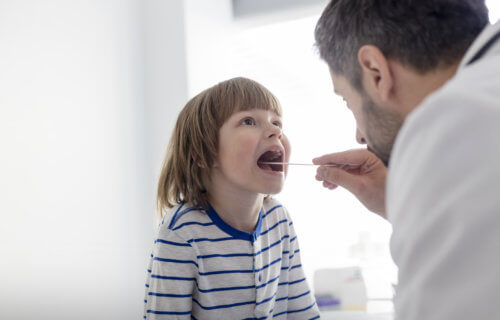SOLNA, Sweden — People who had their tonsils removed during childhood see their risk of of developing a severe form of arthritis later in life rise by more than 30 percent, a new study explains. Moreover, having older siblings can also increase the risk of developing ankylosing spondylitis, a form of chronic inflammatory arthritis.
This condition is marked by inflammation in the spine, joints, and tendons, leading to symptoms like pain, stiffness, and fatigue.
The study, published in the journal RMD Open, supports the theory that childhood infections might contribute to the development of this condition. Although a genetic predisposition remains the primary cause of the disease, researchers believe that early life factors also play a significant role.
Swedish scientists, aiming to dig deeper into this theory, used data from national Swedish population registries. They examined early life exposure to various risk factors in adults, both with and without the condition. To be considered a case, an individual had to have at least one inpatient or outpatient specialist clinic visit with a recorded diagnosis of ankylosing spondylitis between January 2001 and December 2022. For each case, four average individuals from the general public, matching in sex, birth year, and residence region, and without the disease, were also studied.
The early life risk factors examined included: mother’s age at delivery, her weight during early pregnancy, her smoking habits, pregnancy duration, baby’s birth weight, type of delivery (natural or Caesarean section), multiple births, maternal infections during pregnancy, and birth season.
Researchers also considered factors such as the number of siblings, serious childhood infections up to age 15, and removal of tonsils or appendix before age 16.
From 2001 to 2022, 6,771 individuals born after 1973 were diagnosed with ankylosing spondylitis. Out of these, 5,612 were born in Sweden and were chosen as case studies.

The study revealed that having one or more older siblings increased the risk of an ankylosing spondylitis diagnosis by 12 to 15 percent. Serious childhood infections presented a 13-percent increased risk, and tonsillectomy before age 16 was linked to a 30-percent increase in risk. Multiple births increased the risk by 23 percent. Interestingly, those born in summer or autumn had a significantly lower risk than winter-born individuals.
After a sibling comparison analysis, the researchers from the Karolinska Institutet found an 18-percent increased risk for individuals with one older sibling, and this risk rose to 34 percent for those with two or more older siblings. This analysis adjusted for factors like sex, mother’s age, and year of birth.
“The mechanism behind this risk increase cannot be determined from our data, but it has been shown that infants with older siblings are more exposed to infections early in life than infants without siblings,” the researchers explain in a media release.
Although the risk of serious childhood infections researchers observed in the analysis fell to just four percent, the team notes that the risk association with tonsil removal rose to 36 percent after adjusting for other influential factors.
“Having older siblings and a history of tonsillectomy in childhood were independently associated with development of [ankylosing spondylitis], even after adjustment for family shared factors in a sibling comparison analysis. This strengthens the hypothesis that childhood infections play a role in the aetiology of [the condition],” the team concludes.
You might also be interested in:
- Best Anti-Inflammation Supplements: Top 5 Vitamins Most Recommended By Experts
- Too young for arthritis? 15% of global population over age 30 have condition
- Nasal spray for snoring, breathing issues in children may end the need for tonsil surgery
South West News Service writer Stephen Beech contributed to this report.

